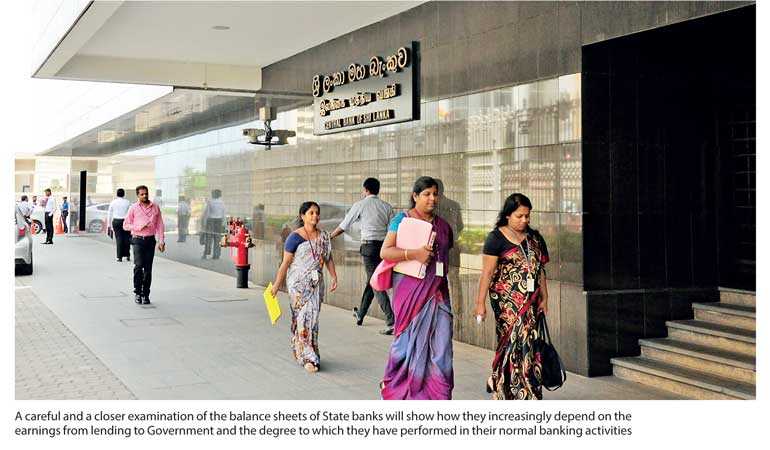Wednesday Feb 18, 2026
Wednesday Feb 18, 2026
Friday, 24 August 2018 00:00 - - {{hitsCtrl.values.hits}}

 By notice published in the Gazette Extraordinary No. 6437 of 2 January 1991, President Ranasinghe Premadasa announced the mandate for appointing the last Presidential Commission on Finance and Banking. This happened during a period when the Government was concerned with the primary economic objective of raising the rate of real income growth to the highest feasible level. The focus was centred on inter-alia;
By notice published in the Gazette Extraordinary No. 6437 of 2 January 1991, President Ranasinghe Premadasa announced the mandate for appointing the last Presidential Commission on Finance and Banking. This happened during a period when the Government was concerned with the primary economic objective of raising the rate of real income growth to the highest feasible level. The focus was centred on inter-alia;
Increase of Foreign Direct Investment, new policies for deregulation and granting of autonomy free of controls and restrictions, improvement of the productivity and the efficiency in the private sector and the improvement of public sector savings through a rationalisation of Government activities were the other elements involved in the strategy of the Government. With regard to the poverty alleviation, the objectives encompassed proposals such as provision of adequate infrastructural base and facilitation of investment support.
The Commission was expected to inquire into the prevailing state of affairs and formulate recommendations within the framework of the strategy and goals of the Government. The terms of reference specifically addressed the need to development of policies and reforms to broad base and modernise financial and banking services in keeping with the ongoing technological advancements.
The State banks were undergoing a critical period in their operations due to capital adequacy problems and other issues regarding administration and control mainly due to political interventions. The activities of several finance companies too were in a state requiring immediate course correction.
Central Bank
What we witness today is a resurgence of the constraints and problems similar to what was faced by the banking and finance industry then. The role of the Central Bank in the recent past shows a sordid picture about its own performance of the activities and responsibilities entrusted to it by statute. Doubts have arisen with regard to the effectiveness of the policies and its mechanisms to regulate, improve and ensure the price stability and monetary policy.
The negativity displayed by the Central Bank in the area of sound checks and controls has affected the country’s image in the international scenario. The role played by the Central Bank in support of the achievement of national objectives and economic priorities is far short of expectations and remains subject to heavy criticism.
Leave alone the bank supervision that it is primarily responsible for, the functions falling within its own realm of affairs such as the management of the EPF (just to cite one example), has been severely messed up. The custodian role it was entrusted with to safeguard the biggest financial fund of the country, the EPF, has been grossly defaulted and abused. The CBSL Treasury bond scam is evident of this renege.
Many instances of lapses have been observed in the supervisory role of the CBSL leading to a scandalous state of affairs in the commercial banks including the total collapse of some finance companies.
State banks
The role of the State banks, their accountability to Parliament, involvement in large-scale financial scams and shady deals are matters debated in public today. The revelations in these regards made by the financial sector have become common news.
The ability and the response of the State banks to respond to calls by the Government to flexibly accommodate and play a prominent role in its development strategies remain constrained. Several instances of alleged violations of conformity regarding the tender procedures and procurement including operational shortcomings have been highlighted.
Interference with appointments, promotions and transfers of bank officials affecting their effective performance are taking place. There is a gross duplication of general functions as well as in the establishment of bank branches between the two major State banks while several other areas remain neglected amidst their unhealthy competition.
Lack of proper coordination and control by a central body has led to a huge wastage of public funds in the IT areas due to unnecessary duplications. Many areas of priority lending mandatorily thrust upon the State banks remain neglected in addition to banking services to backward areas and disadvantaged sectors of the society.
Cooperative movement
With this approach the cooperative movement of the country has dwindled to a very poor state despite the fact that People’s Bank was specially set up to sustain and develop it. The role the bank played during the early periods to extend development credit facilities to remote areas through cooperative societies and rural banking network is non-existent today.
The Government has taken other measures and is trying to provide this facility through alternate means leaving the bank which was set up for this exclusive purpose to dwell in other areas neglecting its primary role. The camouflaged accounts which eventually depict a profit picture serves to cover up their total failure to engage competitively in normal areas of banking business and actively engage in the development activities of the Government.
A careful and a closer examination of the balance sheets of State banks will show how they increasingly depend on the earnings from lending to Government and the degree to which they have performed in their normal banking activities. A large percentage of the lending portfolios of the State banks remains confined to direct Government sources and SOEs.
Pawning advances constitute a fairly significant percentage of the balance amount. This shows that the percentage income generation from normal business activities of the State banks is insignificant. It is evident from this that the State banks with a total commitment to the Government on account of their State-backed capital are surviving in business only because of the earnings they generate by virtue of a right to lend to the Government and not based on any performance efficiency. The same poor states of affairs prevail with regard to the contribution of the State banks towards rural development.
The Government has invested large amounts in the equities of non-State sector commercial banks, by way of their resuscitation as well as in the sustenance of the stock market operations. The State has invested a large amount into the banking Industry as a stake holder. The service element appears to have taken a secondary place and the profiteering aspect has taken precedence in the State banks too in their hot pursuit of profits.
Finance companies
We have seen several instances of finance companies crashing. Sometime back a huge conglomerate of Ceylinco Group caused a serious sensational uproar in the country .This was followed by few other smaller finance companies falling down. The latest is the ETI episode still very fresh in our minds. Many others in operation in the market do not enjoy the degree of confidence sufficient to support their business in the long run. In the meantime many shady deals through leasing and finance companies managed by the banks have come to light. Therefore these institutions too will have to be examined to restore the public confidence and steps have to be taken to safeguard the interests of the depositors and other customers of the finance companies with the introduction of fiscal measures necessary to provide adequate protection.
Credit to the poor and rural credit are areas to be examined by an independent commission to determine the adequacy of the existing system and also to find out whether the industry is sufficiently oriented in this direction.
The market share of the commercial banks in the rural lending has declined. So much so that other non- traditional players such as the NGOs and private companies have entered this market. The social mobilisation that could be imparted through credit delivery to the poor by the banks cannot be replaced and achieved through these alternate means.
An independent commission
It is therefore appropriate at the present time for an independent commission to address these broad issues and make necessary recommendations after a study of the industry within the parameters of the national policy for economic development.
Nearly three decades have passed from the last Banking Commission. Therefore such a step at this stage will help the fulfilment of the visionary ambition of the President to secure a sustainable development strategy and the securing of financial stability.
The establishment of a Commission for Banking and Finance Sectors will be another initiative in the direction of the quantitative and detailed targets associated with the key areas in the recently announced ‘Sustainable Sri Lanka vision and Strategic Path’.
(The writer is a Councillor of the CMC and a former Chairman of Bank of Ceylon.)